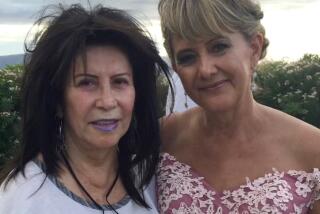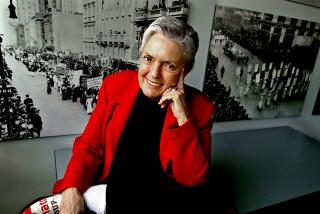Barbara Wiedner, 72; Advocate for Peace Led an International Group
- Share via
Barbara Wiedner, a California grandmother who warily joined a demonstration against nuclear weapons in 1981 and wound up leading an international peace group fueled by maternal grit and love, has died.
The founder of Grandmothers for Peace International, Wiedner died of pancreatic cancer Sunday at home in Elk Grove, a Sacramento suburb. She was 72.
The dimpled, bespectacled mother of 10 and grandmother of 17 ran a volunteer organization with nine official chapters and countless unofficial ones across the nation and in other countries, including England, Finland, India, China and Israel.
She went to the former Soviet Union during the Cold War, to Chiapas, Mexico, during the civil war there, and to Iraq just before the Gulf War exploded.
She was blindfolded and taken by masked guards at night to meet Palestinian leader Yasser Arafat and pinned a Grandmothers for Peace symbol on his uniform. She traded photos of grandchildren with former Soviet President Mikhail Gorbachev, who chided her for leaving grandfathers out of the group.
Back in America, she quietly pressed her beliefs outside military bases and munitions plants and went to jail so many times that her family lost count.
“She was a peacemaker and one of my personal heroes,” said actor Martin Sheen, whom Wiedner met when both were arrested during a protest at Ft. Benning, Ga., a few years ago.
Her husband, Bill, said, “She was just a brave woman and totally dedicated.”
Wiedner wrestled with the idea of becoming a nun when she was growing up in Superior, Wis. But she also wanted to have a dozen babies. At 19, she was married and soon started her family.
Over the next several decades she sometimes worked outside the house, including jobs in Catholic education and writing for the local paper. But, she once said, “I wanted nothing more than to be a wife, homemaker and mother.” She relished the cooking, cleaning and ironing that came with her growing brood.
She also carefully watched the television news accounts of the Vietnam War, the student protest marches and sit-ins. She was devastated by the loss of one of her sons, who was shot by a police officer. His death “added to her political awakening,” said Peg McIntire, a close friend.
In 1981, Wiedner learned that there were 150 nuclear weapons just 15 minutes from her home, at Mather Air Force Base. A group of Christians invited her to join its weekly vigil outside the base. By then a grandmother several times over, Wiedner agreed.
“I realized what those nuclear weapons meant in a global sense,” she told the feminist journal Sojourner a few years ago. “If something wasn’t done, my grandchildren could be a part of the last generation on Earth.”
At 53, She Took Part in Her First Protest
Steeled by that thought, the then-53-year-old woman, who had never held a protest sign or passed out a leaflet, literally walked out of her kitchen into a new life.
“I went and demonstrated,” she recalled, “and I was terrified.”
She found strength in a simple declaration.
“At the demonstration people were holding signs that they had made, and I wanted my sign to identify myself,” she said. “So I had my granddaughter make me a sign that said, ‘Grandmother for Peace.’ That’s how the idea was born. I stood there with my sign, and every time I went to a demonstration I was empowered even more.”
Soon she was no longer “the subdued and quiet mother, granny and housewife.” On Good Friday in 1982, she knelt on the street outside Mather with several other women and was arrested for civil disobedience. Because she was holding her “Grandmother for Peace” sign, her arrest captured headlines.
That evening her 5-year-old grandson, Edward, saw her arrest on the television news. When calls began to pour in, Edward explained what had happened. “My grandmother loves us so much,” he said, “that she has gone to jail to save us from the bomb.”
When Wiedner heard what he had said, it erased any doubts she had about her newfound activism. “I knew,” she said, “I had just given that little boy hope.”
She spent five days in jail. When she got out, she had a meeting in her living room with 10 other women. Each threw a dollar in the treasury. Grandmothers for Peace was born.
“We are not going to sit back and be silent anymore while the world forges forward with nuclear weapons, things that could destroy everybody and everything we love,” she said, recalling the sentiment in the room. “We are not going to keep quiet. That was our vow, and we haven’t shut up since.”
Made a Peace Tour to Russia in 1982
Late that year, in November 1982, she entered the international stage, joining 20 other American women on a peace tour through the Soviet Union. The Cold War was still on, glasnost was years away, and many Americans remained, she said, “terrified of Russians.”
“I cried a lot in that country,” she recalled. “When I looked around at the Russian people, I asked myself, ‘This is the face of the enemy? These beautiful children and these wonderful women? And we’re planning to kill each other?’ ”
At a memorial program for Soviet leader Leonid Brezhnev, who had just died, she said she would pray that his successor and the United States would work toward peace. Her remarks were printed the next day in the official Soviet newspaper Pravda.
She later became a friend of Raisa Gorbachev, who joined Wiedner in an International Grandmothers Walk for Peace in Moscow in the late 1980s.
In her 1991 book “I Hope,” the late Soviet first lady included a picture from an international women’s meeting in 1987 showing herself with her arm wrapped around Wiedner--hard to miss in her red, white and black Grandmothers for Peace T-shirt.
In all, Wiedner made 22 trips abroad, including eight to Russia. Her family says she never divorced her work from who she was.
“Regardless of where she went, she was always a mother first,” said her son John. “She was always a mother, she was always home baking cookies.”
Base’s Commander Joined Her Side
One of her most prized possessions was a note from retired Gen. Lee Butler, who in the early 1980s was a colonel in charge of Mather’s nuclear weapons and later commanded all U.S. Air Force and Navy nuclear defense forces. After his retirement, he joined the peace movement and became a friend of Wiedner’s.
The Air Force eventually removed the nuclear weapons from Mather, which Wiedner counted as one of her group’s successes. She did not take any credit for Butler’s conversion from hawk to peacenik, but she proudly displayed his handwritten letter in her home. “Many thanks,” he wrote, “for your long-standing efforts to save all of us from ourselves.”
Wiedner is survived by two other sons, five daughters, a sister, 17 grandchildren and a great-grandson.
Donations in lieu of flowers may be sent to Grandmothers for Peace International, 9444 Medstead Way, Elk Grove, CA 95758.
More to Read
Sign up for Essential California
The most important California stories and recommendations in your inbox every morning.
You may occasionally receive promotional content from the Los Angeles Times.













